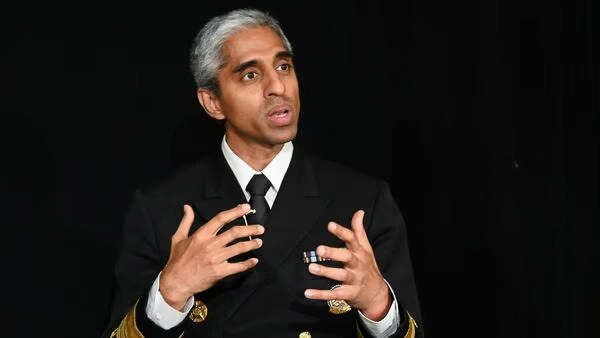Dr. Vivek Murthy stated in an opinion piece in The New York Times that quick action is required to shield young people from the possible negative effects of social media on their mental health.
In Short
- Surgeon general’s call: Dr. vivek murthy calls for mental health warnings on social media.
- Congressional action: Similar to tobacco warnings.
- Youth mental health: Links social media use to anxiety and depression.
- Proposed solutions: Collaborative efforts needed for safer online experiences.
TFD – U.S. Surgeon General Dr. Vivek Murthy is calling for Congress to mandate mental health warning labels on social media platforms. In an opinion piece, he emphasized the urgent need to protect young people from the detrimental effects of social media on their mental health.

On Monday, U.S. Surgeon General Vivek Murthy urged Congress to mandate social media site users to see a warning similar to one they would see on tobacco products.
Murthy stated that social media is “an important contributor” to the urgent problem of the mental health crisis among young people in an opinion piece that was published in The New York Times.
According to him, the language in the warning should warn users about the possible risks the websites and apps pose to their mental health.
“A surgeon general’s warning label, which requires congressional action, would regularly remind parents and adolescents that social media has not been proved safe,” he stated.
Congress imposed unprecedented warning labels on cigarette packs in 1965 in response to Surgeon General Luther L. Terry’s groundbreaking report the year before that linked smoking to heart disease and lung cancer. The first of these labels read, “Caution: Cigarette Smoking May Be Hazardous to Your Health.”
Evidence from tobacco labels shows that surgeon general’s warnings can increase awareness and change behavior,” stated Murthy in the opinion piece. However, he acknowledged the drawbacks and stated that social media wouldn’t be safe with just a label.
He stated that Congress, social media firms, parents, and other stakeholders may take steps to reduce the dangers, guarantee a safer online experience, and shield kids from potential harm.
In the opinion piece, Murthy connected the amount of time kids spend on social media to a rising likelihood of anxiety and depressive symptoms in kids.
Teenagers use popular platforms like YouTube, TikTok, and Instagram for about five hours every day, according to the American Psychological Association. According to a 2019 study by the organization, between 2008 and 2017, when young adults’ use of social media skyrocketed, the percentage of those adults experiencing suicidal thoughts or other suicide-related outcomes climbed by 47%.
And that was prior to the epidemic causing the United States to experience virtual isolation for a full year. Murthy urged social media companies to “proactively enhance and contribute to the mental health and well-being of our children” in the early months of 2021, amid ongoing pandemic lockdowns.
During a Senate Judiciary Committee hearing in January concerning the effects of social media on youth, Mark Zuckerberg, the CEO of Meta, expressed regret to parents who claimed that their children’s exploitation or suicides were caused by the Meta network Instagram.
He said, “I apologize for everything you’ve all had to go through.” “It’s awful.” Nobody ought to experience what your families have gone through.
The exposure to violent and sexual content, as well as to bullying, harassment, and body shaming, are among the possible hazards of social media, according to research referenced in a surgeon general’s public health recommendation on the platform’s mental health that was released last year.
The 2023 recommendation by Murthy also highlighted one thing that social media doesn’t seem to do: it doesn’t always improve mental health via the tried-and-true means of in-person communication.
In a statement released last year to announce the health recommendation, he stated, “For too many children, social media use is compromising their sleep and valuable in-person time with family and friends.
It’s no longer the culture for people to talk to each other anymore,” stated Murthy last month at a symposium concerning the crisis in juvenile mental health.
He has been careful to point out that there is a lack of solid research on the topic, with much of it identifying correlations but not demonstrating cause and effect between social media use and detrimental impacts on mental health.
In the advisory last year, he stated, “More research is needed to fully understand the impact of social media.
Furthermore, he has conceded that social media can give kids a sense of belonging, a platform for self-expression, and a sense of community.
The businesses that created the most widely used social media networks worldwide have not yet replied to the opinion piece published on Monday.
Please visit the website of The National Eating Disorders Association if you or someone you know is experiencing eating disorders.
Conclusion
Dr. Vivek Murthy’s appeal for mandatory mental health warnings on social media highlights a pressing issue in youth mental health. As Congress considers this proposal, it’s crucial to recognize the significant risks posed by social media and the necessity for protective measures. His call to action serves as a pivotal moment for ensuring the safety and well-being of future generations.
Connect with us for the Latest, Current, and Breaking News news updates and videos from thefoxdaily.com. The most recent news in the United States, around the world , in business, opinion, technology, politics, and sports, follow Thefoxdaily on X, Facebook, and Instagram .